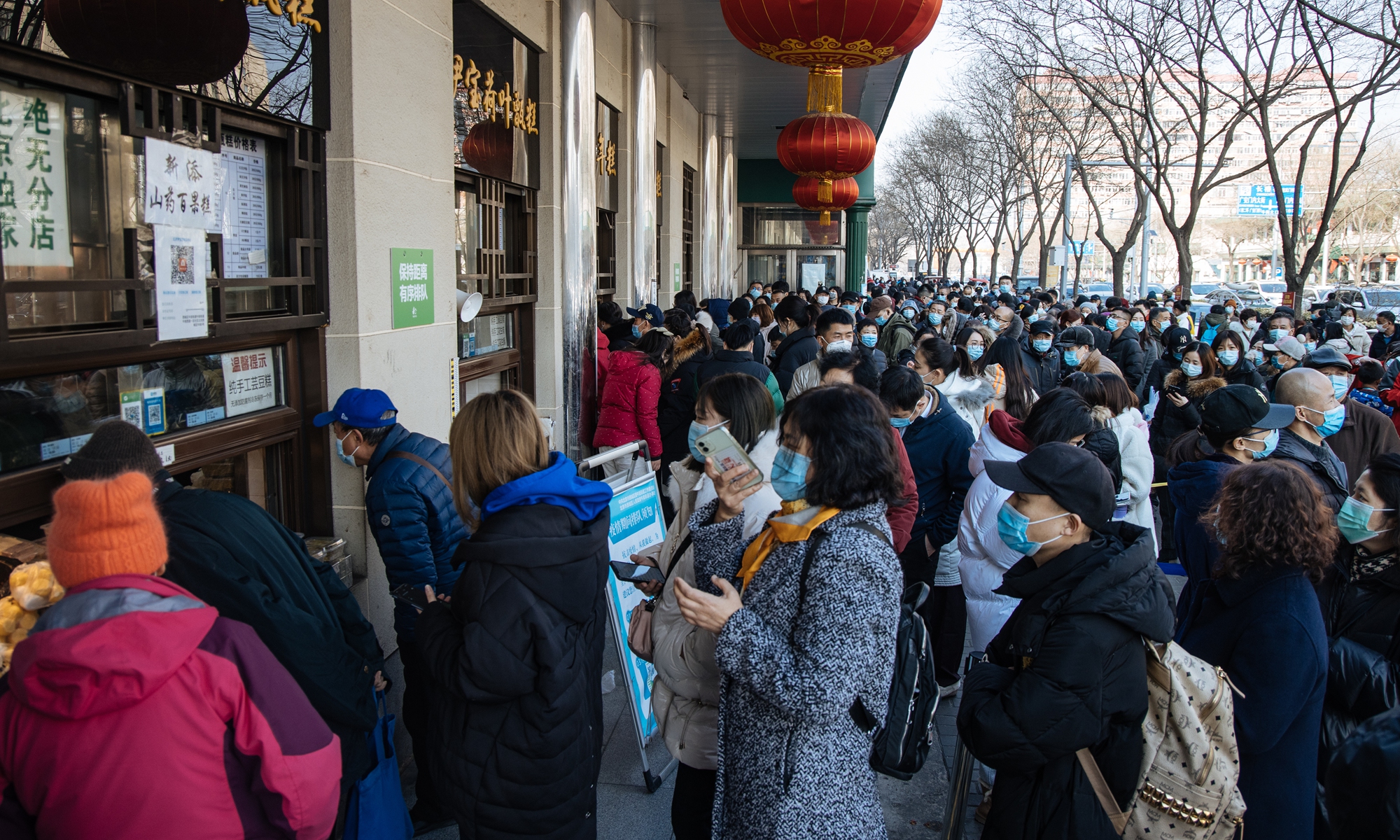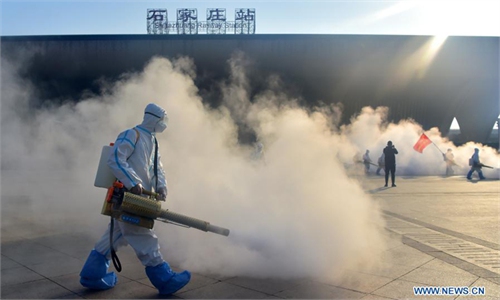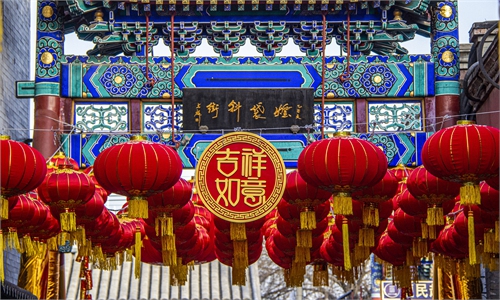
With more people spending the Spring Festival holidays in Beijing rather than going back to hometowns this year to support COVID-19 control work, Beijing's food markets are welcoming more customers than before. Photo: Li Hao/GT
Editor's Note:To the Chinese, the Spring Festival, or the lunar Chinese New Year, always means many things. But the 2020 Spring Festival did not go as Wuhan people had expected. On Chinese New Year's eve last year, the city of 11 million people was locked down - unparalleled in any modern society - that lasted 76 days. People in other places across China were also kept indoors to avoid being infected.
As China has basically put the coronavirus under control, many Chinese expect the 2021 Spring Festival to be an opportunity to make up for what they missed last year - fun, leisure or time shared with family.
But the sporadic cases across China in previous months may make the 2021 Spring Festival, which falls on Friday, different as many people have chosen to stay where they work and live for the holiday instead of returning to their hometown.
How would Chinese people spend this year's Spring Festival? For those who chose to stay where they work and live, what are stories behind their decision? How does metropolis like Beijing, which used to be "empty" during Spring Festival with many leaving for their hometowns, prepare to embrace people for the holiday? The following stories may provide some answers.
Given that the 2020 Spring Festival has been spent in the shadow of the coronavirus, more Chinese people anticipated to have this year's festival with their family members. But as the sporadic cases appeared in many cities across China, they choose to stay where they work and live to celebrate another special holiday.
Liu Huan, a member of the nucleic acid testing team at the Shijingshan Maternal and Child Care Hospital, decided not to return to her hometown in Dingzhou, Hebei Province but to stay in Beijing for the upcoming Spring Festival holiday.
"Many of the medical staff in our hospital chose to stay in Beijing during the holiday although they miss their families at hometown very much. But we are still in a special period currently. If any emergencies happen, we can be right there," Liu told the Global Times.
Liu has been working in Beijing for six years and this will be the first time for Liu not spending the most important festival together with her parents. "I discussed this with my parents half a month ago and my mother agreed as it echoes the government's calls for epidemic prevention work," Liu said.
Given the sporadic cases emerged in several places around China, the country has - for the first time - called for people to stay where they work for the upcoming Spring Festival. Meanwhile, detailed measures have been rolled out to guide the public on their return journeys to their hometowns with many requiring mandatory nucleic acid tests within seven days of travel.
Liu has seen more people coming to the hospital to get nucleic acid tests in recent weeks. Many came with their whole family in order to get "passports" for their hometown reunification.
Though feeling jealousy somehow when she saw these people who would soon reunite with their loved ones, Liu persuaded herself that as soon as this round of epidemic finishes, she will meet her parents happily and safely.
The upcoming Spring Festival has added pressure for the COVID-19 prevention work across China due to the large number of trips during the travel rush - although this year has experienced a sharp decline - and in group activities. Governments of all levels in China have issued notices discouraging gathering to avoid possible cluster infections. Many also suggested people who return to hometown monitor their health and remain indoor as much as possible.
The recent pandemic resurgence nonetheless prevented Hu Yuan'e, a migrant worker in Anji in Zhejiang Province, from returning to her hometown, a small town in Northwest China's Shaanxi Province.
Hu now lives with her husband and 10-year-old daughter in Anji and she chose to stay put for her daughter Xuanxuan. "If Xuanxuan left Anji during the holidays, she might receive a 14-day quarantine notice after returning and might not be able to attend school on time," Hu told the Global Times.
Hu Yuan'e cried after calling her parents to say that she won't celebrate the Chinese New Year holiday with them this year. Over the phone, Hu's parents were apparently disappointed. They'd prepared everything for their annual family reunion. They cleaned the house, dried the quilts, made lots of Hu's favorite local snacks, looking forward to embracing their daughter a few days later.
This will be the first-ever Chinese New Year that Hu spends outside her hometown, a much quieter one than the previous lively ones she celebrated together with her parents and many relatives at their big house in Shaanxi.
"At home, I'm always my parents' baby daughter, enjoying their love and care when we spend the holidays together; but this time, I have to play my role as a mother well and take care of my own daughter," she said.
Missing her hometown's dishes, such as cold noodles and the hamburger-like roujiamo, Hu has bought the ingredients and tools to make these snacks herself during the holidays. "I will learn how to make them from my mom via video calls," she said.
Hu nonetheless supports the advocacy to stay put. There will be massive human migration during the festival, which may increase the [virus transmission] risks, Hu said. "Staying in Anji will be safer and more convenient for me and my relatives at home," she added.
Thanks to hundreds of millions of Chinese people who choose to stay put like Liu and Hu to support the national prevention work against the coronavirus, a special, but safe and warm Spring Festival may follow. The Chinese mainland reported no new domestic cases on Sunday, according to the National Health Commission on Monday, 53 days after the latest round of outbreaks. No new deaths or suspected domestic cases were reported, either.
The phased victory is good news for the upcoming gatherings and family reunions for the Spring Festival, but the guard must not be lowered, especially in previously virus-stricken places, which need more time to announce themselves as virus-free, observers said.




